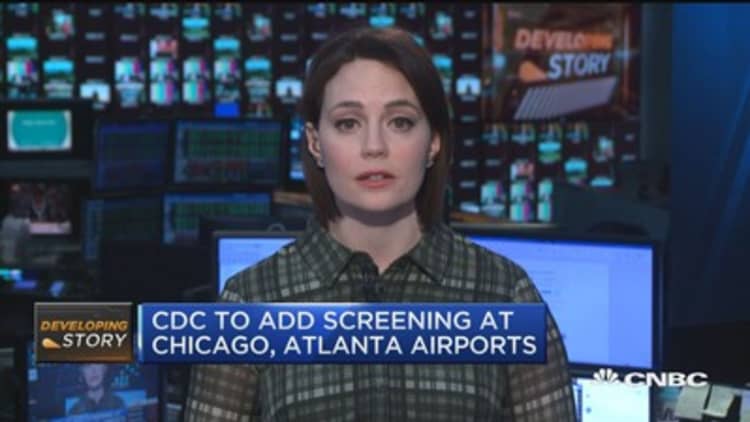Follow CNBC's live blog for coronavirus updates
WASHINGTON — The Pentagon said Wednesday that it will provide housing and support for the nearly 200 U.S. citizens and diplomats evacuated from Wuhan, China — the epicenter of the deadly coronavirus — to the United States.
A U.S. Embassy spokesperson in Beijing told CNBC that the State Department ordered personnel from the U.S. Consulate General in Wuhan to depart for the United States on a chartered flight Wednesday morning local time. The flight from Wuhan Tianhe International Airport to Ontario, California, will stop first in Anchorage, Alaska, for refueling and medical screenings.
The government-chartered flight landed at March Air Reserve Base in Riverside, California on Wednesday. Shortly after the plane landed personnel in biological hazard suits helped passengers load into buses and emergency vehicles on the tarmac.
"Health and Human Services (HHS) is responsible for all care of the evacuees, and DoD personnel will not be directly in contact with the evacuees and evacuees will not have access to any base location other than their assigned housing," wrote Pentagon press secretary Alyssa Farah in a statement.
"Should routine monitoring of the evacuees identify ill individuals, HHS has procedures in place to transport them to a local civilian hospital. DoD will work closely with our interagency partners and continue to monitor the situation. The Department's primary responsibility at this time is the safety of our force, our families, and our base communities," she added.
The virus — which was first diagnosed less than a month ago — has already killed at least 132 people in China and infected roughly 6,100 people around the world.
While the majority of confirmed coronavirus cases are in mainland China, the virus has also been identified in Japan, South Korea, Taiwan, Thailand, Vietnam, Singapore, Nepal, Hong Kong, Macao, Cambodia, Malaysia, Sri Lanka, France, Germany, Australia, Canada, the United Arab Emirates and the United States.
"The military has actually been very effective at the identification of new viruses because we have people everywhere and we have our military laboratories everywhere," Dr. Kayvon Modjarrad, director of the emerging infectious diseases branch at Walter Reed Army Institute of Research, told CNBC.
"While typically the CDC is the lead on these things, the military has reference laboratories pretty much on every continent and specifically, we have labs in all of Southeast Asia, so we act as a force multiplier in providing additional surveillance to the CDC's efforts," he added.
A Department of Defense official told CNBC that the Pentagon's Defense Threat Reduction Agency, or DTRA, worked alongside Thai counterparts to detect the first coronavirus in that country on Jan. 13.
Thailand, which has the most cases of coronavirus outside of mainland China, sees routine deployments of U.S. personnel under DTRA to bolster biosurveillance, biosecurity and biosafety capabilities.
"These investments enhance regional stability and decrease risk to U.S. interests by building our partner's capacity to detect and report disease outbreaks of especially dangerous pathogens, and enhance related biosecurity and biosafety capabilities," the official said.



